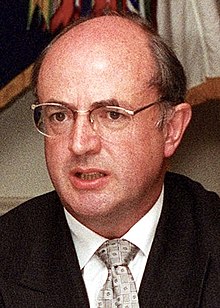Peter Reith
|
The Honourable Peter Reith BEc, LLB (Monash) |
|
|---|---|
 |
|
| Minister for Defence | |
|
In office 30 January 2001 – 26 November 2001 |
|
| Prime Minister | John Howard |
| Preceded by | John Moore |
| Succeeded by | Robert Hill |
| Minister for Employment and Workplace Relations | |
|
In office 21 October 1998 – 30 January 2001 |
|
| Prime Minister | John Howard |
| Preceded by | David Kemp |
| Succeeded by | Tony Abbott |
| Minister for Small Business | |
|
In office 18 July 1997 – 30 January 2001 |
|
| Prime Minister | John Howard |
| Preceded by | Geoff Prosser |
| Succeeded by | Ian Macfarlane |
| Leader of the House | |
|
In office 11 March 1996 – 8 October 2001 |
|
| Prime Minister | John Howard |
| Preceded by | Kim Beazley |
| Succeeded by | Tony Abbott |
| Minister for Industrial Relations | |
|
In office 11 March 1996 – 18 July 1997 |
|
| Prime Minister | John Howard |
| Preceded by | Laurie Brereton |
| Succeeded by | Himself (Minister for Employment and Workplace Relations) |
| Manager of Opposition Business in the House | |
|
In office 31 January 1995 – 11 March 1996 |
|
| Leader | John Howard |
| Preceded by | John Howard |
| Succeeded by | Simon Crean |
| Deputy Leader of the Liberal Party | |
|
In office 24 March 1990 – 13 March 1993 |
|
| Leader | John Hewson |
| Preceded by | Fred Chaney |
| Succeeded by | Michael Wooldridge |
| Deputy Leader of the Opposition | |
|
In office 24 March 1990 – 13 March 1993 |
|
| Leader | John Hewson |
| Preceded by | Fred Chaney |
| Succeeded by | Michael Wooldridge |
| Member of the Australian Parliament for Flinders |
|
|
In office 1 December 1984 – 10 November 2001 |
|
| Preceded by | Bob Chynoweth |
| Succeeded by | Greg Hunt |
|
In office 4 December 1982 – 5 March 1983 |
|
| Preceded by | Philip Lynch |
| Succeeded by | Bob Chynoweth |
| Personal details | |
| Born |
15 July 1950 Melbourne, Victoria |
| Political party | Liberal Party of Australia |
| Alma mater | Monash University |
| Profession |
Lawyer Politician |
Peter Keaston Reith (born 15 July 1950) is a former Australian politician and lawyer. He was a Deputy Leader of the Liberal Party of Australia.
Born in Melbourne, Reith was educated at Brighton Grammar School and at Monash University, from which he obtained bachelor's degrees in economics and law. He then practised as a solicitor first in Melbourne and then at Cowes, a small town on Phillip Island. First elected as a Councillor of the Shire of Phillip Island from 1976, he was Shire President in his last year on the Council in 1981. Whilst living on Phillip Island Reith was behind the establishment of Newhaven College, an independent school on Phillip Island. He was also the key proponent for the establishment of the penguin research facility.
He joined the Liberal Party in 1966. Representing that party, Reith entered the House of Representatives via a by-election in December 1982, caused by the resignation of former Deputy Liberal Leader Sir Phillip Lynch. He did not attend Parliament to be sworn in when he had the chance, and lost the seat of Flinders only three months later at the March 1983 general election. He regained the seat in the December 1984 election, which saw a substantial swing towards the Liberals (though not enough to win them government), and he continued to hold the seat for the next 17 years.
Except for a few months in 1993, Reith was a shadow minister from 1987 until 1996. His posts included Shadow Minister for Housing, Shadow Minister for Sport and Recreation and then Shadow Attorney-General in 1988; in this capacity, he led the successful "no" campaign at the 1988 referendum.He was also Shadow Minister for Defence and Shadow Minister for Foreign Affairs. After the defeat of Andrew Peacock at the 1990 federal election, and Peacock's subsequent resignation from the Liberal leadership, Reith sought the leadership himself, but was defeated by John Hewson, who won 62 votes to 13. Immediately thereafter Reith was elected deputy opposition leader and appointed Shadow Treasurer, a position he held from 1990 to 1993. Along with Hewson, Reith was one of the architects of the Liberal Party's "Fightback" policy, including the Goods and Services Tax. He resigned as Shadow Treasurer after the Liberals were defeated in the 1993 election. In addition, he lost the deputy Liberal leadership in the post-election ballot, and was replaced by Michael Wooldridge. Despite the fact that Reith was the incumbent deputy leader, Reith had five challengers to his position including Wooldridge and Reith did not win enough votes to make to it to the final ballot which saw Wooldridge elected as the new deputy.
...
Wikipedia
